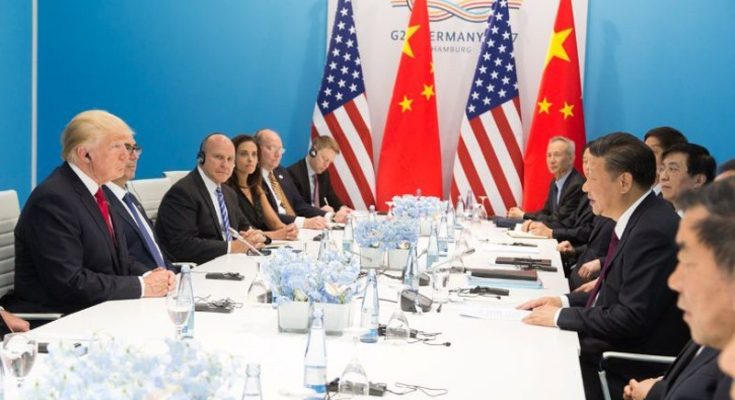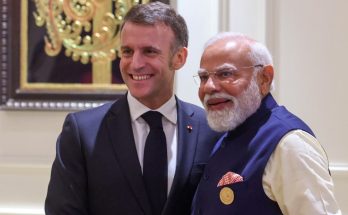#Donald Trump# China# tariffs# trade war# export controls# Xi Jinping# US economy# semiconductors# Rare Earths# markets
IBNS-CMEDIA: Beijing’s announcement of sweeping new export controls on rare earths and other vital materials crucial to the US defence and technology sectors, last week, indicates that US President Donald Trump’s attempts to achieve one-on-one deals with allies and rivals alike could be backfiring.
The development exposed the weakness of Trump’s strategy —long touted as his hallmark of dealmaking prowess—as the fragile truce with China teeters on collapse.
China’s Ministry of Commerce announced the curbs on Wednesday night, New York time.
The move jolted industry insiders but initially failed to shake broader markets—until Trump’s 500-word post on Truth Social around 11 a.m. Friday threatened a “massive increase” in tariffs on Chinese goods.
The announcement sent major US stock indexes tumbling throughout the day, according to a Bloomberg report.
Hours later, Trump said he would impose an additional 100% tariff from November 1, potentially pushing rates to levels both sides previously warned could lead to an effective economic decoupling, the report said.
He also revealed plans to introduce export controls on critical software.
The renewed hostilities between the world’s two largest economies come just weeks ahead of a key meeting between Trump and Chinese President Xi Jinping in South Korea, where both leaders were expected to finalise a broad trade deal.
Central to the talks are export controls—Washington’s restrictions on semiconductors and AI chips vital to China, and Beijing’s controls on minerals and magnets essential to the US.
“The Chinese saw the reaction and leverage they had with export controls earlier this year, so it’s not surprising they would head into these talks to try to stack the deck in their favour,” Jon Hillman, a senior fellow for geoeconomics at the Council on Foreign Relations was quoted as saying by Bloomberg.
“Any agreement will always be at risk if China decides to use that leverage again,” he added.
Trump had previously negotiated a 90-day truce in May, postponing new tariffs and export curbs announced during his April “Liberation Day” speech.
The agreement temporarily steadied global markets rattled by escalating tariffs that had once driven US levies on Chinese goods as high as 145%.
In return, China lifted its export ban on critical minerals and magnets. But as months passed, discontent grew among Trump’s farm-state allies as Beijing halted imports of US soybeans—a move Trump described as a “negotiating tactic.”
The White House has promised relief for farmers, though no package has been announced yet, according to the Bloomberg report.
The fragile calm ended this week when Beijing reimposed export restrictions, putting both nations back on the edge of a trade war.
It’s a familiar cycle for Trump’s transactional diplomacy. Financial markets often rally at news of apparent breakthroughs—with China, Russia, or India—only to tumble again when the deals unravel or are reversed, the report noted.
“The US is now dealing with a more assertive, well-prepared, less US dependent and self-confident Beijing than during Trump 1.0,” wrote Wendy Cutler, senior vice president at the Asia Society Policy Institute, in a LinkedIn post on Saturday. “The past 24 hours leave no doubt that those days are over.”
Friday marked Wall Street’s worst single-day selloff in six months. The market’s volatility index hit its highest level since April.
Nvidia Corp., the world’s most valuable company and a key player in the export-control standoff, fell nearly 5%.
“We’ve actually been very risk averse on the equities side on this view that there’s a lot of uncertainty and risk out there,” Dan White, head of research at Blue Creek Capital, told Bloomberg. “Sentiment in the markets to us was showing a rosy scenario, but the reality is there was a lot of risk and uncertainty out there, so today was a wake-up call for a lot of people.”
Cutler noted that while the US can handle bilateral trade talks with smaller nations, it fares better taking a collective approach against economic giants like China.
Trump hinted that, due to the renewed escalation, his meeting with Xi in South Korea could be called off, though analysts believe both moves may be tactical steps ahead of negotiations. Still, experts and former officials warn that Beijing now holds the stronger hand, according to the report.
“Among the Chinese media in China, there is a recognition that China holds the levers and is using the levers to substantially weaken our manufacturing sector including semiconductors, AI and defense articles,” Bloomberg quoted Nazak Nikakhtar, a former Commerce Department official under Trump and now a partner at Wiley Rein, as saying.
“But if you pursue handshake deals, it’s classic game theory: The other side is going to evaluate your response if they renege. And if they think you’re chicken, they’re just not going to adhere to the deal,” Nikakhtar added.





